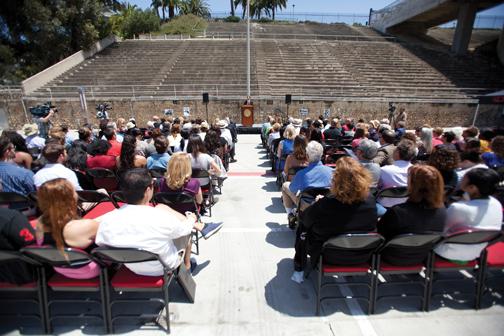
The 50th anniversary of former President John F. Kennedy’s 1963 San Diego State visit was commemorated at the same place the late president gave his speech about the importance of education and California as the then top-ranked state in education. The Aztec Bowl, now under the shadow of Viejas Arena and Lot L, was the stage for an analysis contrasting current educational issues with those from Kennedy’s times. Associated Students executives reenacted the speech and unveiled a new plaque honoring the visit. The original plaque, stolen in 2008, was never recovered.
The event opened with remarks from SDSU President Elliot Hirshman, who asked members of the audience that attended the 1963 speech to stand up. About 15 people, including former A.S. president Robert Weir, stood up while the rest of the audience cheered.
“It’s a glorious history and it was a glorious day,” Weir said. “I remember his suit. He had a blue striped suit on. I remember his tie. I remember his shoes were capped. I just remember everything about him, because how often do you get to meet the president?”
Department of Anthropology Chair Seth Mallios took the stage and, before diving into his historical analysis of history, he congratulated those who participated at a student symposium earlier that morning.

“It’s easy in moments of anniversary to worry about the future, but after hearing these student leaders talking about the issue of education today, I’ve never felt more optimistic and motivated at the same time,” Mallios said.
Mallios listed reasons why Kennedy’s visit was an influential moment in history. These included the fact that Kennedy was the only sitting president to visit SDSU; the impending doom of nuclear war, which haunted the nation at that time, a nation pulled apart by segregation; the Civil Rights Act which was signed a week after the speech; SDSU’s first honorary doctorate degree to Kennedy paving way for SDSU’s first Ph.D in 1967.
A.S. president Rob O’ Keefe, executive Vice President McNutt and vice president of external affairs Rivera reenacted parts of Kennedy’s speech.
“The first question, and the most important: Does every American boy and girl have an opportunity to develop whatever talents they have?” McNutt read. “All of us do not have equal talent, but all of us should have an equal opportunity to develop those talents.”
Kennedy’s speech continues with citations of numerous facts alluding to the imbalance of education, including unequal average expenditures for a boy or girl in public schools between California and Mississippi and the unequal proportion of white high school graduates compared to minorities.
After the ceremony, McNutt reflected on the state of education and how it’s as prevalent now as it was during Kennedy’s time.
“The motivation and passion for educating our people has decreased,” McNutt said. “Legislators should take from this speech their responsibility as elected representatives to service their constituents in that way and do their part in reassessing education in California.”







